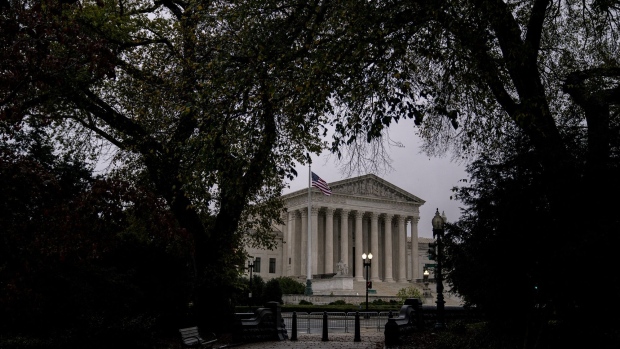Jun 9, 2023
Coinbase Suit May Finally Send Crypto Debate to US Supreme Court
, Bloomberg News

(Bloomberg Law) -- The SEC’s new lawsuit against Coinbase Global Inc. appears best positioned among cryptocurrency cases to let the US Supreme Court finally decide if digital assets count as securities.
The crypto tokens traded by Coinbase users should be treated as unregistered securities, the US Securities and Exchange Commission said in the suit filed June 6 in federal court in New York. The importance of that issue, combined with the case’s big actors and relatively clear-cut facts, makes it more likely to reach the nation’s high court than similar lawsuits against peers like Binance Holdings Ltd. and Ripple Labs Inc.
“It goes to the heart of the nation’s market structure and our system of traditional finance,” said Michael Pierson, managing partner of the global corporate practice at FisherBroyles LLP in New York.
The legal question could unlock the door to broad federal enforcement of the crypto industry under securities laws. Coinbase shares fell 12% on the day the SEC filed its lawsuit.
The SEC charged Coinbase with two big violations, selling unregistered securities and operating an unregistered exchange, according to professor Erik Gordon of the University of Michigan Ross School of Business.
“But you’re only running an exchange if it deals in securities,” he said. “That will be the issue” for the Supreme Court.
Coinbase is willing to take its legal fight with the SEC all the way to the Supreme Court if necessary, the company said on the day the lawsuit was filed.
Is This The One?
The Coinbase suit is “uniquely well positioned” among crypto lawsuits to reach the Supreme Court, BTIG analyst Isaac Boltansky said in a note on Tuesday.
Gordon agreed that SEC v. Coinbase Inc. is the one that looks most likely to go all the way up because some of the other cases were brought by state authorities or private parties.
“Those aren’t as likely to go up the chain as one brought by the SEC"—which is the “preeminent” securities regulator in the US, he said. The facts aren’t particularly disputed and there’s nothing atypical about Coinbase’s assets, making it a good case for the justices, he said.
“The Supreme Court prefers to take a case with broad applicability,” Gordon said.
The SEC accuses Coinbase of operating an exchange while acting as a broker and as a clearing agency, three functions that are traditionally separated, said FisherBroyle’s Pierson.
“Therefore, this could be a perfect case to consider the myriad issues related to market structure for digital assets, because it encapsulates all the issues that would have to be considered under the federal securities laws,” he said.
Choosing a Hard or Interesting Case
Other securities experts see room for the justices to choose a different case.
“The question of what is and what isn’t a security is fundamental so I would think the Supreme Court would look for an opportunity to weigh in,” said Kevin O’Brien of Ford O’Brien Landy LLP in New York, who’s a former federal prosecutor.
But the court may prefer a case that more fully tests the limits of what constitutes a security in order to illustrate the exact boundary, he said.
Kiran Nasir Gore, who practices in Washington as a litigator and arbitrator working in crypto and is a lecturer at GW Law at George Washington University, said the high court might want a case with fraud allegations.
“While other commentators have said that Coinbase is the best case for Supreme Court review, the Binance case is a little more interesting,” she said. “It includes allegations of bad actions, diverting customer funds, improperly commingling assets, failing to restrict U.S. customers from its platform, and misleading customers about its controls.”
“The SEC thrives on ferreting out these kinds of bad acts, and of course the policy reasoning is that this protects investors and the industry as a whole,” she said. “If we’re in a scenario where there’s allegations of misconduct, then that truly gets to the heart of the activities the SEC is designed to protect investors from.”
Time for Clarity
Attorneys said there’s a need for the Supreme Court to weigh in.
The justices could apply a 1946 test, formulated in SEC v. W. J. Howey Co., or it could rewrite it entirely, attorneys say. Under Howey, an “investment contract"—which would be considered a security—exists if there’s an “investment of money in a common enterprise with a reasonable expectation of profits to be derived from the efforts of others.”
“The lack of regulatory clarity is the real issue,” Gore said. “If the crypto industry is to have longevity and stability, the regulatory framework needs to be laid out. The industry isn’t going away, it’s here to stay.”
“The question is, how does that regulatory framework get jump-started? From the SEC’s perspective, lawsuits can be an effective tool,” she said.
O’Brien said the Supreme Court could provide that guidance.
“It’s time for a new set of guidelines or standards or rules from the Supreme Court about what is and what is not a security, maybe with specific reference to the characteristics of this industry which are different than anything we’ve seen before,” he said. “It’s a whole new world.”
The case is SEC v. Coinbase Inc., S.D.N.Y., No. 1:23-cv-04738, complaint 6/6/23.
—With assistance from Felice Maranz.
To contact the reporters on this story: Martina Barash in Washington at mbarash@bloomberglaw.com; Chris Dolmetsch in Federal Court in Manhattan at cdolmetsch@bloomberg.net
To contact the editors responsible for this story: Carmen Castro-Pagán at ccastro-pagan@bloomberglaw.com; Drew Singer at dsinger@bloombergindustry.com
©2023 Bloomberg L.P.





